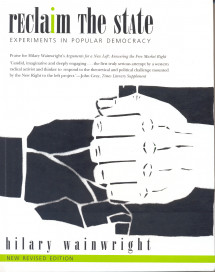Reclaim the State: Experiments in Popular Democracy (Seagull, 2009)
Topics
Reclaim the State sets out on a journey from Brazil to Britain to discover how people are creating new, stronger forms of democracy. The book shows that the foundations for new political directions for deepening democracy already exist, and provides imaginative and practical tools for building on them.

Authors
From Seattle to Cancun, protest movements have taken centre stage in global politics. But if the momentum of these international movements is to grow, they must be rooted in local action to create greater democratic and economic justice in everyday life. Reclaim the State sets out on a quest to discover how people are creating new, stronger forms of democracy.
The journey starts in the deep south of Brazil, in Porto Allegre and the Workers Party´s radical model for public investment decisions. In East Manchester - the origins of Britain´s industrial revolution - the government´s promise of ‘community-led’ regeneration is tested as public money is used to rebuild shattered neighbourhoods. On the outskirts of the commuter town of Luton, ex-squatters and ravers join with established residents´ groups to take control of public resources and forge a new social economy. Finally, in Newcastle, council workers see off an attempt by British Telecom to take over local services and win the battle for a democratic public alternative.
Reclaim the State shows that the foundations for new political directions already exist, and provides imaginative and practical tools for building on them.
‘An extremely valuable contribution to the debate about concrete alternatives to Neo-Liberalism.’
Naomi Klein
‘Hilary Wainwright has gone in search of the questions to the key issues of our time - how can we gain access to the levers of power, democratize them and then use them to effect progressive change? She returns with answers free of dogma and full of insight.’
The Guardian.
Buy Reclaim the State: Experiments in Popular Democracy on Amazon.com or Amazon.co.uk.
Pages: 470
